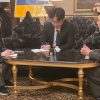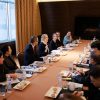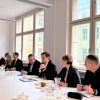Звернення європейських експертів до членів Ради Європи у зв’язку з ситуацією щодо можливого повернення у січні російській делегації права голосу попри невиконання Росією жодної резолюції ПАРЄ.
Разом з європейськими колегами закликаємо членів Ради Європи не стати жертвами російського шантажу і не скасовувати санкції щодо Росії (зокрема, позбавлення її права голосу в ПАРЄ), введені після анексії українського Криму та військової агресії на Донбасі.
Повний текст звернення і список підписантів нижче.
Council of Europe Should not Become Russia’s Trophy
We, thinkers of contemporary Europe, call upon the Member States of the Council of Europe not to fall prey to Russia’s blackmailing and not to lift sanctions (including suspension of the voting rights in PACE) on Russia, introduced after the annexation of Ukraine’s Crimea and military aggression in Donbas.
Not a single measure, required from Russia by the PACE resolutions 1990 (2014), 2028 (2015), 2034 (2015), 2063 (2015), 2067 (2015), 2112 (2016), 2132 (2016) and 2133 (2016) have been implemented. Instead, Russia has turned to blackmail, having suspended two thirds of its membership fees to the Council of Europe and boycotting all formal contacts and participation in the Assembly.
Now, despite its 2016 resolution stating that the dialogue can only be restored after “significant and measurable progress towards the implementation (of previous resolutions)”, the PACE may reconsider its own commitments and invite Russia back to the table, thus lifting the sanctions with no deliverables from Russia’s side. This decision is going to be debated at the PACE session in January 2018 in Strasbourg.
We believe that such a step would be a disgrace for the Council of Europe and surrender of the mission it has pledged to uphold over almost 70 years of its existence. We are especially worried about the following effects that such a decision would have upon the democracy and security of the European continent:
1) Lifting sanctions upon Russia without any progress in the implementation of the PACE resolutions would destroy the credibility of the Council of Europe as an organization capable of standing guard of human rights and freedoms in Europe. Effectively, it would put an end to the Council of Europe transformative power and influence in the region;
2) Such a step could trigger a domino effect in the members of the Council of Europe.
3) Last but not least, such a step would be a heavy blow to pro-European political forces and civil society in Ukraine, who would be stripped of arguments on why Ukraine’s European integration is the only viable alternative. This could, in turn, compromise all the efforts and dramatic price Ukraine has paid for its democratic and reform-oriented path.
We call upon the Parliamentary Assembly and Secretary General of the Council of Europe to uphold the very mission for which it was created and reject unconditional return of the Russian Federation to the Assembly as well all attempt to blackmail the organization. Such principled position will serve the best of both, Ukraine and Europe, and their peaceful future.
We invite all our European colleagues to join us in the signature of this letter.
Signatories:
Willem Aldershoff, former head of unit, European Commission, Analyst international affairs (Belgium)
Steven Blockmans, Senior Research Fellow and Head of EU Foreign Policy, Centre for European Policy Studies (Belgium)
Jos Boonstra, Senior Researcher and EUCAM Coordinator, Centre for European Security Studies (The Netherlands)
Francisco de Borja Lasheras, Director of the Madrid Office, policy fellow, European Council on Foreign Relations (Spain)
Dr. Erhard Busek, former Vice Chancellor, Chairman of the Institute for the Danube Region and Central Europe (Austria)
Dr. Iannis Carras, historian (Greece)
Carmen Claudín, Senior Research Fellow Associate, Barcelona Centre for International Affairs (Spain)
Iulian Chifu, Director, Center for Conflict Prevention and Early Warning (Romania)
Simas Čelutka, Director of European Security Programme, Vilnius Institute for Policy Analysis (Lithuania)
Vit Dostal, Director of the Research Center, Association for International Affairs (Czech Republic)
Dr. Joerg Forbrig, Senior Transatlantic Fellow, Central and Eastern Europe, The German Marshall Fund of the United States (Germany)
Alyona Getmanchuk, Director, New Europe Center (Ukraine)
Gustav C. Gressel, Senior Policy Fellow, Wider Europe Programme, European Council on Foreign Relations (Germany)
Dr. Stepan Grigoryan, former MP, Chairman of the Board, Analytical Centre on Globalization and Regional Cooperation (Armenia)
Iulian Groza, Director, Institute for European Policies and Reforms (Moldova)
Jakub Janda, Deputy Director of European Values Think-Tank, Head of the Kremlin Watch Program (Czech Republic)
Kornely Kakachia, Professor, Tbilisi State University; Director, Georgian Institute of Politics (Georgia)
Tatiana Kastoueva-Jean, Head of Russia-NIS Center, French Institute of International Relations (France)
Peter Kreko, Director of Political Capital Institute (Hungary)
Jana Kobzova, Associate Fellow, European Council on Foreign Relations (the United Kingdom)
Petr Kolář, Czech diplomat, former Ambassador to Russia and to the United States (Czech Republic)
Wojciech Kononczuk, Senior Research Fellow, Centre for Eastern Studies (Poland)
Dr. Jacek Kucharczyk, President, Institute of Public Affairs (Poland)
Edward Lucas, senior vice-president, Center for European Policy Analysis; former senior editor at The Economist (the United Kingdom)
John Lough, Managing Director, JBKL Advisory Ltd; Associate Fellow, Russia and Eurasia Programme, Chatham House (the United Kingdom)
Dr. Stefan Meister, Head of Robert Bosch Center for Central and Eastern Europe, Russia, and Central Asia, German Council on Foreign Relations (Germany)
Marie Mendras, Professor, Paris School of International Affairs-Sciences Po, Paris (France)
James Nixey, Head, Russia and Eurasia Programme, Chatham House (the United Kingdom)
Zaneta Ozolina, professor, University of Latvia (Latvia)
Massimiliano Di Pasquale, writer and essayist, member of the Italian Association of Ukrainian Studies (Italy)
Irakli Porchkhidze, Senior Vice-President, Georgian Institute for Strategic Studies (Georgia)
Wojciech Przybylski, editor-in-chief of Visegrad Insight, Chairman, Res Publica Foundation (Poland)
Dr. Kristi Raik, Senior Research Fellow at the Finnish Institute of International Affairs (Finland)
Hanne Severinsen, former Danish MP, Council of Europe, Co-rapporteur for Ukraine Danish Helsinki Commlttee for Human Rights (Denmark)
James Sherr, Associate Fellow, former head of the Russia and Eurasia programme, Chatham House (the United Kingdom)
Susan Stewart, Senior Associate, German Institute for International and Security Affairs (Germany)
Alice Stollmeyer, Executive Director, Defending Democracy (Belgium)
Dovilė Šukytė, Acting Director, Eastern Europe Studies Centre (Lithuania)
Oleksandr Sushko, Research Director, Institute for Euro-Atlantic cooperation (Ukraine)
Andrzej Szeptycki, Associate Professor, University of Warsaw (Poland)
Andreas Umland, political scientist, historian, editor of the book series “Soviet and Post-Soviet Politics and Society” ibidem Press Stuttgart (Germany/Ukraine)
Lasha Tughushi, Director, Liberal Academy Tbilisi (Georgia)
Kataryna Wolczuk, professor, University of Birmingham, Associate Fellow, Russia and Eurasia Programme, Chatham House, (the United Kingdom)







